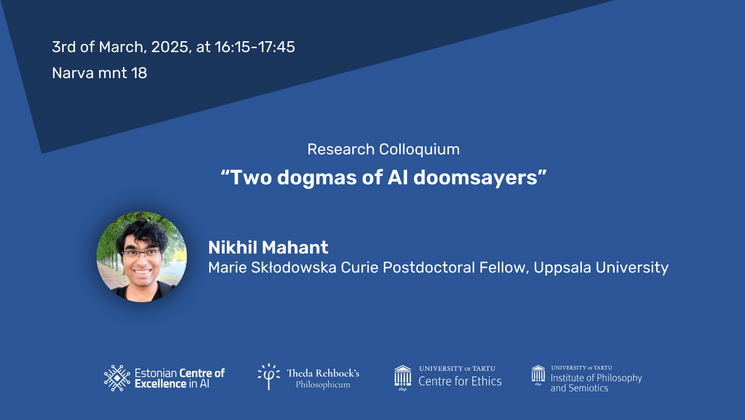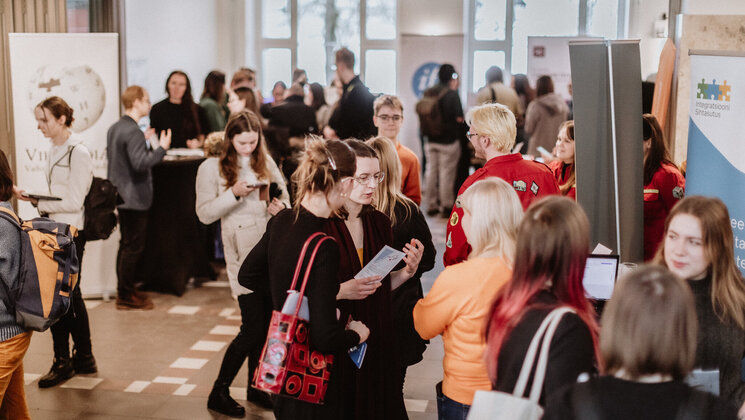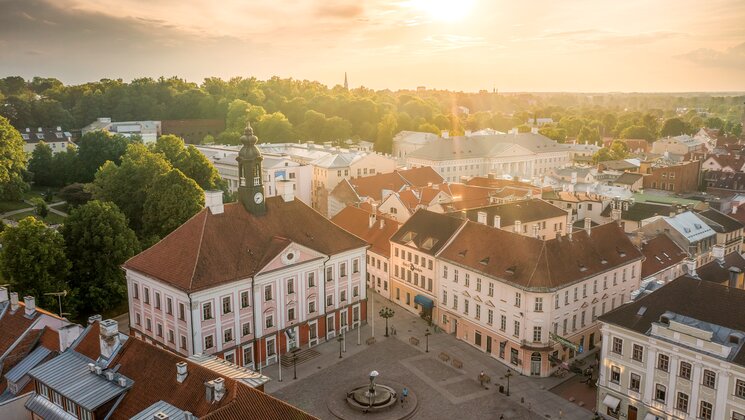-
Faculty of Arts and HumanitiesDean's Office, Faculty of Arts and HumanitiesJakobi 2 ruumid 116–121, 51005 Tartu linn, EST0Institute of History and ArchaeologyJakobi 2 51005 Tartu linn, Tartu linn, Tartumaa EST0Institute of Estonian and General LinguisticsJakobi 2, IV korrus 51005 Tartu linn, Tartu linn, Tartumaa EST0Institute of Philosophy and SemioticsJakobi 2, III korrus, ruumid 302-337 51005 Tartu linn, Tartu linn, Tartumaa EST0Institute of Cultural ResearchÜlikooli 16 51003 Tartu linn, Tartu linn, Tartumaa EST0Institute of Foreign Languages and CulturesLossi 3 51003 Tartu linn, Tartu linn, Tartumaa EST0School of Theology and Religious StudiesÜlikooli 18 50090 Tartu linn, Tartu linn, Tartumaa EST0Viljandi Culture AcademyPosti 1 71004 Viljandi linn, Viljandimaa EST0Professors emeriti, Faculty of Arts and Humanities0Associate Professors emeriti, Faculty of Arts and Humanities0Faculty of Social SciencesDean's Office, Faculty of Social SciencesLossi 36 51003 Tartu linn, Tartu linn, Tartumaa EST0Institute of EducationJakobi 5 51005 Tartu linn, Tartu linn, Tartumaa EST0Johan Skytte Institute of Political StudiesLossi 36, ruum 301 51003 Tartu linn, Tartu linn, Tartumaa EST0School of Economics and Business AdministrationNarva mnt 18 51009 Tartu linn, Tartu linn, Tartumaa EST0Institute of PsychologyNäituse 2 50409 Tartu linn, Tartu linn, Tartumaa EST0School of LawNäituse 20 - 324 50409 Tartu linn, Tartu linn, Tartumaa EST0Institute of Social StudiesLossi 36 51003 Tartu linn, Tartu linn, Tartumaa EST0Narva CollegeRaekoja plats 2 20307 Narva linn, Ida-Virumaa EST0Pärnu CollegeRingi 35 80012 Pärnu linn, Pärnu linn, Pärnumaa EST0Professors emeriti, Faculty of Social Sciences0Associate Professors emeriti, Faculty of Social Sciences0Faculty of MedicineDean's Office, Faculty of MedicineRavila 19 50411 Tartu linn, Tartu linn, Tartumaa ESTInstitute of Biomedicine and Translational MedicineBiomeedikum, Ravila 19 50411 Tartu linn, Tartu linn, Tartumaa ESTInstitute of PharmacyNooruse 1 50411 Tartu linn, Tartu linn, Tartumaa ESTInstitute of DentistryL. Puusepa 1a 50406 Tartu linn, Tartu linn, Tartumaa ESTInstitute of Clinical MedicineL. Puusepa 8 50406 Tartu linn, Tartu linn, Tartumaa ESTInstitute of Family Medicine and Public HealthRavila 19 50411 Tartu linn, Tartu linn, Tartumaa ESTInstitute of Sport Sciences and PhysiotherapyUjula 4 51008 Tartu linn, Tartu linn, Tartumaa ESTProfessors emeriti, Faculty of Medicine0Associate Professors emeriti, Faculty of Medicine0Faculty of Science and TechnologyDean's Office, Faculty of Science and TechnologyVanemuise 46 - 208 51003 Tartu linn, Tartu linn, Tartumaa ESTInstitute of Computer ScienceNarva mnt 18 51009 Tartu linn, Tartu linn, Tartumaa ESTInstitute of GenomicsRiia 23b/2 51010 Tartu linn, Tartu linn, Tartumaa ESTEstonian Marine Institute0Institute of PhysicsInstitute of ChemistryRavila 14a 50411 Tartu linn, Tartu linn, Tartumaa EST0Institute of Mathematics and StatisticsNarva mnt 18 51009 Tartu linn, Tartu linn, Tartumaa EST0Institute of Molecular and Cell BiologyRiia 23, 23b - 134 51010 Tartu linn, Tartu linn, Tartumaa ESTTartu ObservatoryObservatooriumi 1 61602 Tõravere alevik, Nõo vald, Tartumaa EST0Institute of TechnologyNooruse 1 50411 Tartu linn, Tartu linn, Tartumaa ESTInstitute of Ecology and Earth SciencesJ. Liivi tn 2 50409 Tartu linn, Tartu linn, Tartumaa ESTProfessors emeriti, Faculty of Science and Technology0Associate Professors emeriti, Faculty of Science and Technology0Institute of BioengineeringArea of Academic SecretaryHuman Resources OfficeUppsala 6, Lossi 36 51003 Tartu linn, Tartu linn, Tartumaa EST0Area of Head of FinanceFinance Office0Area of Director of AdministrationInformation Technology Office0Administrative OfficeÜlikooli 17 (III korrus) 51005 Tartu linn, Tartu linn, Tartumaa EST0Estates Office0Marketing and Communication OfficeÜlikooli 18, ruumid 102, 104, 209, 210 50090 Tartu linn, Tartu linn, Tartumaa EST0Area of RectorRector's Strategy OfficeInternal Audit OfficeArea of Vice Rector for Academic AffairsOffice of Academic AffairsUniversity of Tartu Youth AcademyUppsala 10 51003 Tartu linn, Tartu linn, Tartumaa EST0Student Union OfficeÜlikooli 18b 51005 Tartu linn, Tartu linn, Tartumaa EST0Centre for Learning and TeachingArea of Vice Rector for ResearchUniversity of Tartu LibraryW. Struve 1 50091 Tartu linn, Tartu linn, Tartumaa EST0Grant OfficeArea of Vice Rector for DevelopmentCentre for Entrepreneurship and InnovationNarva mnt 18 51009 Tartu linn, Tartu linn, Tartumaa EST0University of Tartu Natural History Museum and Botanical GardenVanemuise 46 51003 Tartu linn, Tartu linn, Tartumaa EST0International Cooperation and Protocol Office0University of Tartu MuseumLossi 25 51003 Tartu linn, Tartu linn, Tartumaa EST0
Andreas Ventsel is leading projects that focus on studying strategic historical narratives and communication in the coming years, as well as promoting digital literacy to defend against misinformation.

Andreas Ventsel, Associate Professor in Semiotics is leading research projects on strategic historical narratives and strategic communication in the context of the Ukrainian war, and as a partner in the Erasmus project, is looking for opportunities to develop digital literacy education.
The "Relational Approach of Strategic History Narrative" project, which started in January 2023 and is funded by the Estonian Research Council for five years, aims to develop an innovative theoretical framework that allows the study of the structure of historical narratives disseminated by the Russian Federation (RF), their transmedia transmission, and the strategic goals pursued by them. The project focuses on the study and comparative analysis of historical narratives spread to influence the audience in Russia, the Baltic states, Poland, and Ukraine. The project also seeks to promote Estonia's strategic resilience against information operations, such as the use of historical narratives related to World War II.
The project's key research questions are:
- What are the main strategic goals of the Russian Federation’s strategic history narratives towards domestic and foreign audiences and which actors are empowered and subordinated by these narratives?
- What are the cultural-mythological roots of the strategic history narratives and what kind of meaning-making do they evoke?
- How does the use of the Russian Federation’s transmedia strategy differ as regards the target audience and which countermeasures could be constructive in public diplomacy for mitigating its effect?
Other members of the research team include Researcher Mari-Liis Madisson from the Semiotics Department and Professor of Regional Political Studies Andrei Makarychev from the Johan Skytte Institute.
Articles and other essential information related to the project can be found on the project's website.
This project is also closely related to a three-year project funded by the Estonian Defence Forces: “Strategic Communication in the Context of the War in Ukraine: lessons learned for Estonia”, whose main goal is to study strategic communication in the context of the Ukrainian war, mainly focusing on Ukrainian strategic communication and Russian influence operations. Other members of the research team from the University of Tartu include Associate Professor of Communication Studies, Sten Hansson from the Institute of Social Studies, and Researcher Mari-Liis Madisson from the Semiotics Department. Experts and researchers, cooperation partners, and consultants from various institutions (Defence Academy, Tallinn University of Technology, etc.) engage in the project, as well as information warfare and strategic communication experts from Estonia and Ukraine.
The study focuses on the emotional dimension of the Ukrainian conflict through the analysis of communication between four actors - Russia, Ukraine, the USA, and the European Union. It examines the speeches of political institution representatives and the coverage of national strategic documents in the media and analyses various discursive acts, which, in their mutual interaction, shape the meaning of the event.
The main research questions of the project are:
- What narratives were used to legitimize/delegitimize the pre-war tension, and what were their ideological-cultural origins?
- How did the "normalization of war" occur, i.e., how did the audience "get used to" the real situation of war and its various stages of escalation?
- How is the communication of a possible solution to the conflict (ending the war) and its results carried out?
More information can be found at ETIS.
In addition, Andreas Ventsel and Mari-Liis Madisson from the University of Tartu also participate in a three-year Erasmus+ collaboration project called "Students’ of Higher Education critical digital Literacy Development against Disinformation” led by Cergy Paris University.
The project aims to develop critical digital literacy education for lifelong learning, providing necessary skills and competences to resist rapidly spreading disinformation through digital media. It will generate theoretical frameworks and practical solutions for organizing new courses in European higher education, connecting students with the labour market and professional sectors, enabling them to navigate a world full of algorithms, participate in civil society, and protect democracy. The project also stimulates innovative learning and teaching practices, while offering teaching staff opportunities for professional development. The project team consists of researchers from France, Poland, Greece, Cyprus, Belgium, and Estonia.
Read more similar news






